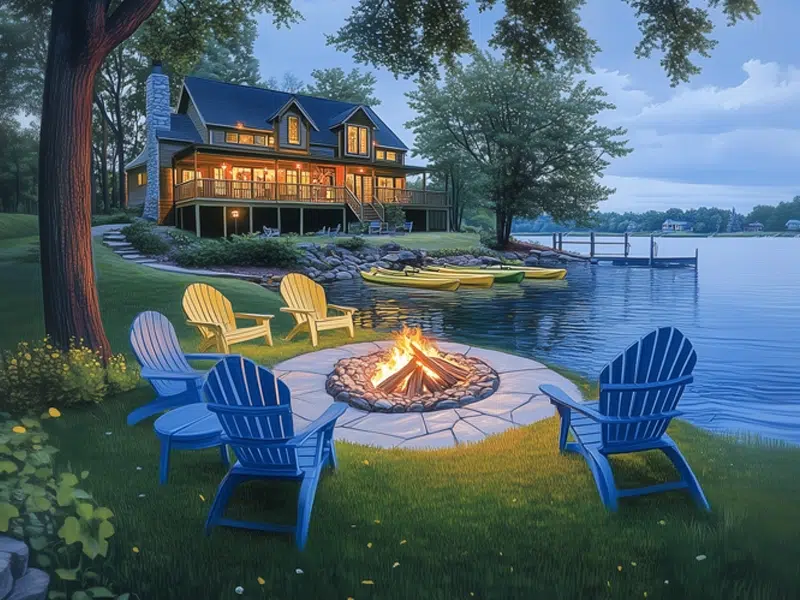Current Airbnb Laws and Regulations in Northern California
Airbnb Laws have changed in Northern California due to the increase in tourism to the region, and many cities and counties are now placing restrictions on noise levels and the number of days a rental may be rented, as well as requiring permits and liability insurance.
If you have questions about short-term rentals in California, contact Proper Insurance. Our agents are experts in the vacation rental industry. Call 888-631-6680 today.

Berkley, California
New Eligibility Rules for Short-Term Rentals
The City of Berkley has strict eligibility on who can and cannot rent out a short-term rental (STR). They declare that hosts CAN list their properties as a STR if: the home is your primary residence or approved by the property owner if you are a tenant, are covered in liability insurance of $1 million, and are located within an approved zoning district.
However, hosts CANNOT STR their unit if it was built after April 1, 2017, it has been used as a long-term rental since April 1, 2017, and/or is a below market-rate unit. Hosts are also not eligible if they have had a no-fault eviction in the last five years or don’t comply with the requirements of the Berkely Housing Code.
What hosts will need in order to apply:
- Proof of Ownership: Proof of ownership of the property or property owner approval (I.e., deed, signed property owner agreement form, or a property tax bill)
- Proof of Residency: Three forms of proof of residency
- Zoning Certificate: Complete a short-term rental zoning certificate
- Taxes and Fees: Non-refundable fee and monthly Transient Occupancy Tax
- Guest Requirements: A list of requirements for guests to follow
San Francisco, California
Enacts New Airbnb Laws in Wake of Increasing Population
Due to high population density and increasing tourism, the City of San Fransisco has enacted new Airbnb Laws. Specifically, these laws seek to limit the number of investment entities operating a large number of properties, but allow individuals to continue short-term rentals. In order to operate a short-term rental, you must be a resident of the property and spend at least 275 nights a year at the property. Only one short-term rental may be registered per person. In addition, owners may only rent 90 un-hosted days per year.
Other requirements include:
- Registration with the City for the short-term rental
- Payment of all tourist taxes associated with lodging
- Adherence to the eligibility of property type
Only specific types of dwellings are authorized to run a short-term rental. Full details and eligibility can be found on the SF Short-term rental FAQ.
San Jose, California
Short-Term Rentals Laws and Regulations
The city of San Jose has regulated short-term rental (STR) use by implementing a permit. The permit aims to keep the STR community sustainable due to the popularity of San Jose as a destination. To stay current with the ever-changing regulations please visit the city of San Jose’s website.
The current regulations are in place:
- Zoning: STRs can operate in single-family homes, two-family homes, multi-family homes, mobile homes, or guest houses however they are not permitted in an Accessory Dwelling Unit (ADU). Make sure hosts are compliant with City Zoning by visiting the cities municode.
- Permits: Must obtain a business license with proof of paid transient occupancy taxes.
- Days Rented Out Maximum: If the host is not present, they are restricted to a maximum of 180 days per year. If the host is present, there is no restriction on the number of nights rented out.
- Point of Contact: When the host is absent from the premises, they must notify visitors and provide a phone number for a local representative.
San Leandro, California
Bans Non-Hosted Short-Term Rentals as Part of New Airbnb Laws
As of June 19, 2019, non-hosted short-term rentals are not allowed in the City of San Leandro per the new Airbnb Laws. However, hosted short-term rentals are allowed to be operated within city limits. These new restrictions come after a much-heated debate between community advocates and short-term rental owners. Hosts will also have to register and maintain good standing with the City, and only individuals can apply for permits rather than companies.
Violation of these ordinances can result in fines of $1,000 and a misdemeanor charge carrying up to six months in jail.
Other restrictions and requirements include:
- Adherence to noise-minimizing regulations
- A hosted short-term rental may not be rented out more than 180 days per calendar year
- Payment of all local tourism taxes
As in most cases, these ordinances allowing short-term rentals do not supersede HOA covenants or bylaws, and prospective short-term rental owners should check with local rules. While the City is not requiring proof of liability insurance, it is important for short-term renters to obtain protection given the nature of short-term rentals.
San Mateo County, California
Enacts New Airbnb Laws Requiring Permits and Liability Insurance
San Mateo County revisited its Airbnb Laws to better maintain a balance between community concerns, government oversight, and owners. Short-term rental owners will now be required to register for a permit with the county and must comply with all transient tax codes. This permit expires every three years, giving short-term rental hosts plenty of time to adjust their business model before renewal.
To apply for a permit from the county, the following is required:
- A valid Transient Occupancy Registration Certificate in order to comply with all tax codes
- Evidence of on-site parking
- Copy of the rental or lease agreement between the owner and a prospective short-term tenant or copy of advertisement offering the short-term rental, which details the number of tenants allowed, on-site parking available, trash and recycling information, and noise ordinances.
- Proof of liability insurance for short-term rentals
In addition, all property owners and residents of neighboring properties shall be given notice 10 days in advance to approve or denial of a short-term rental permit and be allowed to voice concerns. The county seeks to preserve its traditional neighborhood feeling while also allowing the organic growth of the local tourism industry.
Santa Rosa City, California
Council Approves Urgent Airbnb Laws—Permit Now Required
The Santa Rosa City Council of California approved an urgent Airbnb Law to better regulate short-term rentals. Before this short-term rental ordinance was put in place there were no regulations regarding rentals of residential properties for a period of 30 days or less, AKA vacation rentals. With the rise of public complaints and around 160 vacation rentals operating illegally, addressing the situation was in the public’s best interest.
Short-term rentals will now be required to register with the city in addition to other requirements ranging from taxes to providing information to guests. In order to apply for a permit with the city, owners will need to provide the contact details of a local contact or of the owner, a site plan detailing the parking situation, a floor plan showing the location of all fire and carbon monoxide alarms, and occupancy limits.
In order to operate, the following will need to be adhered to:
- Adherence to noise code, including quiet hours from 9:00 pm to 8:00 am and a prohibition on outdoor speaker systems
- Disclosure of video and audio recording devices to guests
- Prohibition on large events and functions
- Inclusion of information on online advertisements such as the maximum number of guests, number of dedicated parking spaces, and the short-term permit.
Sonoma County, California Airbnb Laws
Now Requires Adherence to Noise and Other Ordinances as Part of New Airbnb Laws
Airbnb laws in Sonoma County, California are continuing to develop as tourism rises post-pandemic. In addition to requiring all short-term rentals to obtain an operational permit, there are now several requirements owners must follow in order to operate. These include but are not limited to:
- Point of Contact: A certified property manager must be available 24/7 to address any complaints or concerns from tenants and neighbors.
- Fire Safety: Adherence to fire codes, including the use of fire pits. In instances where fire pits are not permitted due to wildfire risk or other city ordinances, hosts are required to provide such information to guests.
- Pets & Noise: If pets are allowed in the short-term rental, they are to be secured on the property. Excessive barking or noise by unattended pets is not permitted. Amplified noise is not allowed at any time.
- Taxes: Payment of all transient tax codes
- Posting of vacation rental permits within the rental and notification of neighbors
During the permit application process, owners are required to submit documentation on the maximum number of overnight guests, day guests, total guestrooms, and on-site parking available. All of this information, as well as specific noise limits, can be found on the Sonoma County website.
South Lake Tahoe, California STR Laws
Short-Term Rentals Now Permitted in South Lake Tahoe
In March 2025, the El Dorado County Superior Court overturned Measure T, a 2018 ordinance that restricted short-term vacation rentals (STRs) in South Lake Tahoe’s residential neighborhoods. The court found the measure’s exemption for permanent residents unconstitutional, leading to the reinstatement of prior STR regulations.
- Licensing: Getting started with short-term rentals in South Lake Tahoe means navigating three key licensing options based on property type and usage.
- Vacation Home Rentals (VHRs) are for non-residential zones like the Tourist Core Area. Property owners must apply for a VHR permit, meet occupancy limits, and provide paved parking. The VHR application process involves submitting a VHR application, completing an inspection, and meeting specific requirements such as providing exterior and interior signage.
- Qualified Vacation Home Rentals (QVHRs) are available to permanent residents renting their primary residence for up to 30 non-consecutive days per year. QVHR applicants must prove residency, complete a property inspection, and submit a comprehensive application, including a signed declaration of compliance and proof of property tax exemption.
- Hosted Rentals are for homeowners or long-term tenants renting part of their primary residence while living on-site. The application process for Hosted Rentals includes submitting a Hosted Rental application and proof of primary residency, and adhering to regulations like occupancy limits, parking restrictions, and quiet hours.
License Types for Airbnbs in South Lake Tahoe, CA
| Permit Type | Primary Residence Required | Maximum Rental Days | Proof of Property Tax Exemption | On-Site Host Required |
| Vacation Home Rentals (VHRs) | No | No limit | No | No |
| Qualified Vacation Home Rentals (QVHRs) | Yes | 30 non-consecutive days/year | Yes | No |
| Hosted Rentals | Yes | No limit while host is on-site | No | Yes |
- Zoning: STRs are primarily allowed in non-residential zones such as the Tourist Core Area. Rentals outside of designated areas may be subject to stricter regulations or prohibitions. In residential areas, short-term rentals are limited to Qualified Vacation Home Rentals only, with a maximum of 30 non-consecutive rental days per year. View the South Lake Tahoe Zoning Map for more information.
- Occupancy Limits: Occupancy limits are specified in the permit conditions, ensuring that the number of guests does not exceed the capacity deemed safe and appropriate for the property and neighborhood.
- Parking: Adequate off-street parking must be provided, with the number of spaces determined by the property’s size and occupancy limits. Parking on unpaved surfaces or in a manner that obstructs traffic is prohibited.
- Noise & Quiet Hours: Quiet hours are enforced between 10:00 PM and 8:00 AM. Excessive noise, including outdoor spas and hot tubs with mechanical noise-producing elements. Noise violations during these hours can result in fines for both occupants and owners. For Hosted Rentals, outdoor amplified sound is prohibited at all times.
- Trash: All STR properties are required to have bear-resistant trash containers to prevent wildlife encounters.
- Safety & Compliance: Properties must undergo safety inspections to ensure compliance with building codes, including functioning smoke detectors, carbon monoxide detectors, and fire extinguishers.
- Point of Contact: Owners must designate a local contact person available 24/7 to address any issues arising during guest stays.
- Taxes: All short-term rentals are subject to a Transient Occupancy Tax (TOT) of 12% or 14%, depending on the property’s location, along with additional fees.
- Penalties: Violations of STR regulations can result in fines ranging from $1,000 to $5,000, depending on the nature and frequency of the offense.
- More Information: For detailed information on permit applications and compliance requirements, visit the City of South Lake Tahoe’s Short Term Rentals page.
During the permit application process, owners are required to submit documentation on the maximum number of overnight guests, day guests, total guestrooms, and on-site parking available. All of this information, as well as specific noise limits, can be found on the Sonoma County website.
Verify Your Short-Term Vacation Rental Insurance Today
Interested in a policy to protect you and your business from liability and damage claims? Proper Insurance is the nation’s leading short-term rental insurance provider protecting homes in all 50 states, replacing inadequate Homeowners/Landlord policies. Their comprehensive coverage meets or exceeds standard short-term rental requirements with $1M Commercial Liability (CGL) and unmatched protection for your property and revenue. Additional custom coverages include guest-caused theft/damage, amenity liability (bikes, kayaks, hot tub, etc.), bed bugs, fleas, squatters, and more.
Please note: The information provided is intended as a guide and may not be comprehensive or current. Regulations may change and could vary by area or situation. Always consult local authorities or a legal professional to ensure you have the most accurate information for your short-term rental property.






